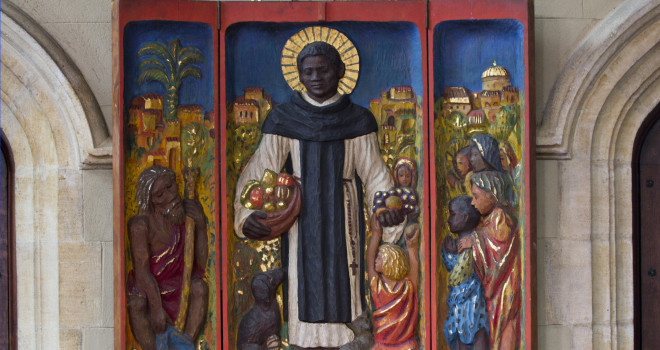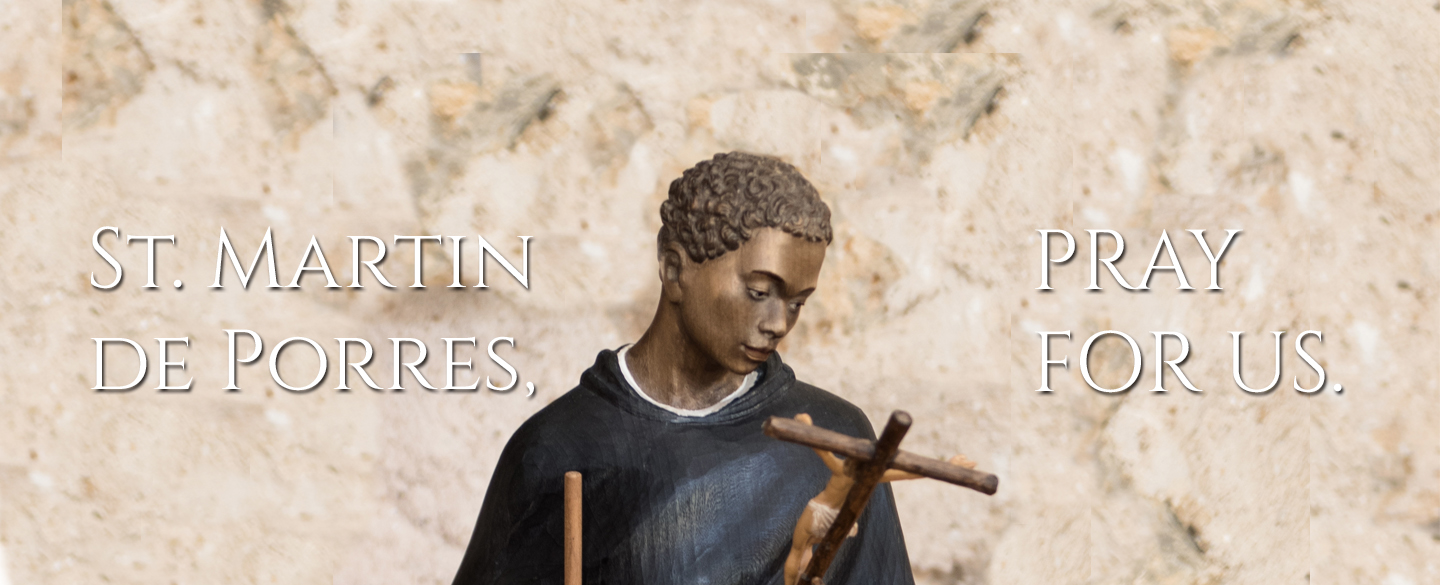
St. Martin de Porres was a religious brother, a mystic, and a man of extraordinary charity. Martin was born to an unmarried woman, Anna Velasquez, in 1579 in Lima, Peru. Anna was a freed slave. Martin’s father, Juan de Porres, was a Spanish noble. He initially denied paternity of the “mulatto” or mixed race child and much of Martin’s childhood was spent with his impoverished mother. Juan also had a daughter with Anna and he mostly ignored his children’s existence for several years, but eventually accepted them as his and allowed them to use his name. With time, Juan took his children to Ecuador and provided a private education for them.
Martin learns a valuable trade
Juan was named governor of Panama when Martin was twelve and Juan provided for his continued education in Lima as an apprentice barber-surgeon. At this time, barbers were also taught to be surgeons and medicinal healers and it was a highly respected profession. Martin mastered these skills and put them to good use later in life. As a young teen, he became aware of a religious calling after having been a devout and prayerful child. He was accepted in 1594 by the Dominicans in Lima as a lay worker and tertiary, and he felt unworthy to become a vowed member of the community. After nine years, he finally gave his consent to become a fully professed brother.
Extraordinary charity
As a Dominican brother, Martin was assigned several different tasks at the convent, Holy Rosary Priory. Over the years, he served as the caretaker of the wardrobe, the infirmarian for sick brethren, and the barber. He was also asked to direct the convent’s food distribution to the poor of the city of Lima. In addition to these duties and the daily ordered life of a religious, Martin lived a life of extraordinary spiritual and corporal activity. He was able to collect remarkable amounts of alms for the poor, to the point that it was believed the funds grew supernaturally. These donations were given directly to the poor, and it was in doing this that Martin was most happy. He befriended people from all walks of life, and he had a special affection for afflicted black people, prisoners, and victims of epidemic diseases. He frequently helped people with their personal problems by simply listening and offering sound advice. For the Black people who were predominantly regarded as subhuman, Martin taught them the rudiments of their Catholic faith, that they were beloved children of God, equal in human dignity to everyone else. He planted a fruit orchard just outside of the city to provide food for the poor, and used his medicinal training to help the sick whom he visited. His kindness and compassion even extended to animals. He had a special way with them and they sought him out. He opened an animal hospital for their care in a room of his sister’s home. He refused offers of advancement at his convent and wished instead to remain a simple brother for the rest of his life.
Mystical experiences and gifts 
Martin’s active life filled with corporal works of mercy was buttressed by a remarkable spiritual life. He spent long hours of the night in prayer and imposed strong penances upon himself, including never eating meat. Numerous times he was witnessed deeply engrossed in prayer while hovering several feet in the air. While he never left Lima and his great desire to serve as a foreign missionary was never realized, many were the traders, merchants and missionaries who swore that they saw Martin serving as far away as China, the Philippines, and north Africa. His ability to bilocate also occurred locally, where he was several times seen at the bedside of a dying person at the same time he was at the convent. Martin also possessed the gifts of prophecy and healing, including a miraculous healing when he prayed over his own archbishop. In 1639, Martin became ill with a mysterious fever that appeared every four days. He predicted not only the day, but also the hour of his death. In his final hours, Martin had visions of several saints and of the Virgin Mary. He died at age sixty November 3 after kissing a crucifix. There were miracles attributed to his intercession reported soon after his passing. When his coffin was opened while being moved, his body was discovered to be incorrupt and it emitted a rose-like fragrance.
St. Martin de Porres was a simple, humble man who bore God’s love to those around him. He had a special love and sympathy for African slaves. All he ever wanted was to live a life of communion with God and to help other people. He was a contemporary and close friend of St. Rose of Lima and they were both baptized in the same font. He was canonized in 1962 and is the patron of racial harmony, barbers, and people of mixed race. His feast day is celebrated November 3, and his shrine is located at the Church of Santo Domingo in Lima.
